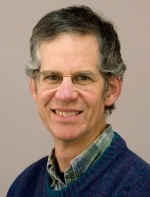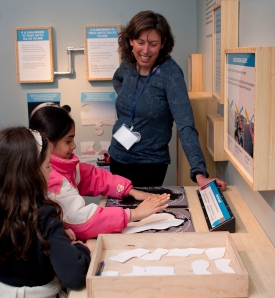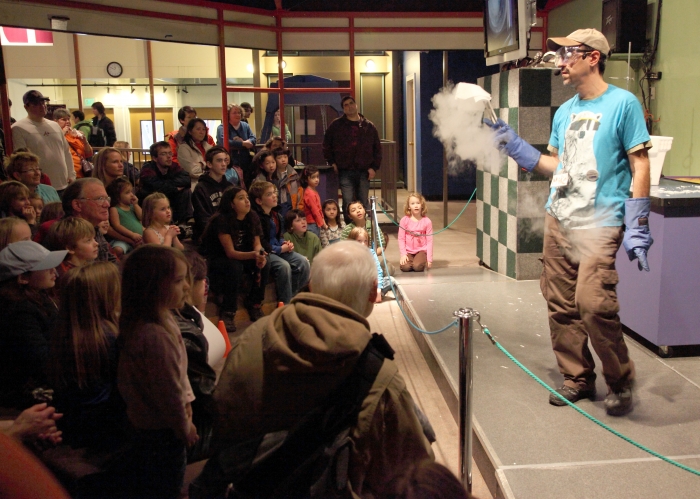By: Harry Stern, Polar Science Center, Applied Physics Laboratory, University of Washington

Public outreach is an important part of the mission of scientific agencies such as NSF and the National Aeronautics and Space Administration (NASA). While scientists are usually enthusiastic about their research they typically don't think about how to present it to general audiences and they may lack the time or confidence to seek out such opportunities. Partnerships with informal science education institutions offer scientists the chance to reach large public audiences and to develop the skills to communicate with them. The institutions benefit from the new content presented by the scientists that engages their visitors in face-to-face interactions. One such model is the Polar Science Weekend at Pacific Science Center.
Polar Science Weekend (PSW) is an annual four-day event featuring a wide variety of hands-on activities and live demonstrations about the polar regions and current polar research. The event is presented by scientists from the University of Washington's Polar Science Center and other departments, and held at Seattle's Pacific Science Center, which is the most well-attended museum in the Pacific Northwest. PSW was conceived and organized by the Polar Science Center and the Pacific Science Center in 2005. The first PSW was held in March 2006. Attendance at Pacific Science Center during PSW is typically between 5,000 and 10,000 visitors. PSW brings students, teachers, and families face-to-face with active scientists who work in some of the most remote and challenging places on Earth to learn first-hand about polar research in a fun and informal setting.

An integral part of PSW is the Science Communication Short Course given in the months preceding the event, in which scientists and graduate students are trained in how to explain their research to the public and how to design engaging activities. This series of workshops, conducted by professional staff from Pacific Science Center, has been found to effectively increase scientists' comfort and skills in working with the public. Pacific Science Center also offers a one-time "refresher" workshop for scientists to brush up on their communication skills. Effective communication with the public is increasingly recognized as an important skill for scientists to possess.
The motivation for the first PSW grew out of the Polar Science Center's desire to improve the "broader impacts" of its NSF-funded research. After the success of the first PSW, Pacific Science Center launched its Portal to the Public project funded by NSF, whose purpose was to develop and test program models that engage scientists and public audiences in face-to-face interactions. This led to further "research weekends" at Pacific Science Center. This project was awarded the Roy L. Shafer Leading Edge Award for Visitor Experience by the Association of Science and Technology Centers in 2010. In 2012, Pacific Science Center won the National Medal for Museum and Library Service, the nation's highest honor conferred on museums and libraries for extraordinary community service and outreach. The award citation says (in part), "Pacific Science Center seeks to go beyond just teaching guests about science. Its Portal to the Public program connects the public with cutting-edge science by training scientists to demonstrate and explain their research." The concept began with Polar Science Weekend, which has continued every year since 2006.

A grant funded by NASA from 2010 to 2013 supported the annual PSW events and enabled the center to train 45 scientists and graduate students in science communication; design and construct an interactive exhibit at Pacific Science Center called "Investigating Arctic Ice Melt" that runs for several months each year; bring more than 1,000 students to Pacific Science Center free of charge, many from low-income districts; and provide professional evaluation of the event.

Popular activities at PSW include Glacier Flow, Polar Science Technology, Narwhal Mysteries, Sea Ice Thickness from Space, Salinity Taste Test, and dozens of others. Visitors pick up a Passport to the Poles that lists all the activities and stations at PSW, including a question for each station. Visitors take their passports to the various stations, talk to the scientists, write down the answers to the questions, and receive stamps in their passports. This stimulates inquiry, motivates kids to visit more stations, and promotes interactions between visitors and scientists. One visitor from the Renton High School Science Club wrote afterwards: "I loved the vast amount of exhibits/stations and all the passionate exhibitors/station managers! It made me really appreciate the scientific opportunities and gave me more options to consider in the future. This was the best exhibit type event that I've ever been to, and I am very interested in polar science now."
Plans for the future, subject to funding, include developing polar activities for Pacific Science Center's Science on Wheels program, which brings science demonstrations to rural schools across the Pacific Northwest; a new exhibit about the Greenland and Antarctic ice sheets; subsidized transportation to bring underserved school groups to PSW; training for undergraduates to participate in PSW; linkages between PSW activities and the new Next Generation Science Standards; and more opportunities for scientists to interact with the public beyond PSW.
The next Polar Science Weekend at Pacific Science Center will be 6 - 9 March 2014. Organizers look forward to continuing the partnership between the polar research community and the informal science education community in Seattle.
For more information contact Harry Stern (harry [at] apl.washington.edu) or Meena Selvakumar (MSelvakumar [at] pacsci.org).
